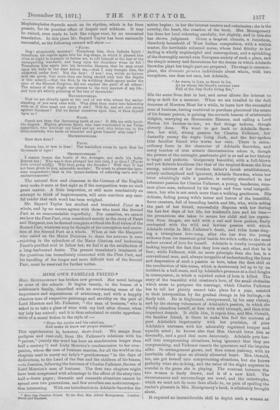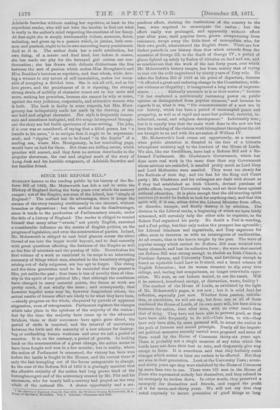MINE OWN FAMILIAR FRIEND.* Mits. MONTGOMERY has broken new ground.
Her novel belongs to none of the schools. It begins tamely, in the bosom of a nobleman's family, described with an overweening sense of the importance and separateness of aristocracy, and with a happily obsolete tone of respective patronage and servility on the part of Lord Moreton and Mr. Falkener, " the man of business," who is asked in to take a glass of wine with my lord after dinner, when my lady has retired ; and it is thus calculated to excite apprehen- sions of a moral fiction in the style of :—
" Bless the squire and his relations,
And make us know our proper stations."
This apprehension is, however, short-lived. We escape from pedigree and rent-roll, from Mr. Falkener's relations with his "patron," (surely the word has been an anachronism longer than half a century ?) and Lady Moreton's condescension to her com- panion, whom the man of business marries, for all the world as the chaplain used to marry my lady's " gentlewoman" in the days of dedications, to the Laud of the Sun and the children of his beams, —to Jamaica, following the fortunes of Charles Falkener, the son of Lord Moreton's man of business. The first two chapters might have been compressed with advantage to the effect of the story into half-a-dozen pages ; dramatic and romantic situations cannot be spread over two generations, and few novelists can make retrospec- tion interesting. With our introduction to Adelaide Snowden the
* Mina Own Familiar Friend. By the Hon. Mrs. Alfred Montgomery. London: Hurst and Blaokett.
action begins ; in her the interest centres and culminates; she is the novelty, the heart, the creation of the book. Mrs. Montgomery has done her local colouring carefully, but slightly, and in this she has shown judgment. Given a tropical climate, a luxurious, disorderly household of West Indian composition, with a sottish master, the inevitable coloured nurse, whose fatal fidelity to her darling is wholly unprincipled and unscrupulous, and a sprinkling of the thoroughly second-rate European society of such a place, and the simple scenery and decorations for the drama in which Adelaide Snowden plays her tragic part are prepared. The stage is common- place, the dramatis personas individuals about whom, with two exceptions, one does not care, but Adelaide, "As warm in love, as fierce in ire,
As he whose life-blood's current runs Full of the Day-God's living fire,"
fills the scene from first to last, and never allows the interest to drop or drift for a moment. When we are recalled to the dull decorum of Moreton Moat for a while, to learn how the successful man of business, having contrived to purchase piecemeal the estate of his former patron, is gaining the seventh heaven of aristocratic delights, marrying an Honourable Eleanor, and calling a Lord Barton his brother-in-law, we find things tedious, though cleverly done. We want to get back to Adelaide Snow- don, her wild, strong passion for Charles Falkener, her dastardly enemy the negro Long Jack, and the fair-spoken false familiar friend who works her ruin. There is extra- ordinary force in the character of Adelaide Snowden, aud many touches of true artistic discrimination adorn it, though the picture of the untaught, passionate girl is as sad as her history is tragic and pathetic. Gorgeously beautiful,with a full-blown and yet delicate loveliness like that of the tropical flowers she lives among, mistress of her drunken father's lavish establishment, utterly undisciplined and ignorant, Adelaide Snowden, whom her lover admiringly calls a panther, is entirely absorbed in her vehement passion for Charles Falkener, a young, handsome, com- mon-place man, redeemed by his tragic end from total insignifi- cance, but who is not much more than a walking gentleman. His delicate, fading young wife's terror and horror of the beautiful, fierce creature, full of bounding health and life, who, while acting the part of her friend, successfully disputes with her during the last few days of her life, her husband's love and his time— the precautions she takes to secure her child and her reputa- tion from danger, are told with a sad and keen pathos, finely contrasted with the wild and lawless passion with which Adelaide exults in Mrs. Falkener's death, and rides home sing- ing a triumphant love-song, after she has won the young widower from his transient grief beside his wife's coffin to the most ardent avowal of love for herself. Adelaide is totally incapable of looking beyond the fact that they love each other, and that he is free ; while Falkener, with no more principle than she has, is a conventional man, and, always incapable of understanding the force and desperation of such a passion as hers, takes the first chill at the recollection of this scene, which is dexterously led up to by an incident in a ball-room, and by Adelaide's presence at a duel fought in consequence, in which a rejected suitor of hers is killed. The story of the beautiful wild creature's love, of the small obstacles which arose to postpone the marriage, which Charles Falkener has to tell her plainly cannot take place for a year, assisted in their interposition by the gradual change in his feelings,—is finely told. He is frightened, overpowered, by his easy victory, and by the stormy vehemence of Adel aide's passion, to which she wholly abandons herself, at first with wild triumph, and then with impatient despair. It chills him, it repels him, and Mrs. Oswald., the familiar friend, is there to make him feel the contrast of poor Adelaide's impetuosity with her precision, of poor Adelaide's unreason with her admirably regulated temper and equable mind ; he knows also that Mrs. Oswald loves him as devotedly, and a good deal more decorously. Adelaide gets her- self into compromising situations, being ignorant that they are compromising, and Falkener resents the ignorance and the impulse alike. So estrangement grows, and then comes jealousy, with its inevitable effect upon an already alienated heart. Mrs. Oswald, too, can get herself into compromising situations, but she knows perfectly what she is doing, and the value of the slight exposure to scandal in the game she is playing. The contrast between the two women is finely drawn, and is of a new kind. The circumstances and surroundings are novel, and the catastrophe, which we must not do more than allude to, on pain of spoiling the reader's pleasure in Mrs. Montgomery's book, is admirably brought about.
It required no inconsiderable skill to depict such a woman as Adelaide Snowden without making her repulsive, at least to the superficial reader, who will not take the trouble to find out what is really in the author's mind respecting the creations of her fancy. At first sight she is simply irredeemably violent, sensuous, fierce, unfeeling, and given up to a passion which, in justice, both com- mon and poetical, ought to be its own exceeding heavy punishment. And so it is. The author deals her a swift retribution, her own doing, of a severe and final kind, but before it comes, she has made our pity for the betrayed girl outrun our con- demnation ; she has drawn with delicate distinctness the line between the sort of passion which makes Miss Broughton's and Miss Braddon's heroines so repulsive, and that which, while driv- ing a woman to any extent of self-immolation, makes her incap- able of accepting a divided love. She is not all evil, and as her love grows, and the punishment of it is ripening, the strange strong strain of nobility of character comes out in her more and more, making her powerless, because she cannot be wily or mean, against the very judicious, respectable, and attractive woman who is both. The book is faulty in some respects, but Mrs. Mont- gomery has indisputably made her mark by the drawing of this one bold and original character. Her style is frequently inaccu- rate and sometimes inelegant, and the songs interspersed through- out the story are but feeble specimens of verse-writing. The joke, if it ever was so considered, of saying that a titled person has " a handle to his name," is so antique that it ought to be superannu- ated; and " ripples " are not to be found " in the depths" of a smiling sea, where Mrs. Montgomery, in her concluding page, would have us look for them. But these are trifling errors, which practice will correct, and they form no serious drawbacks to the singular cleverness, the real and original merit of the story of Long Jack and his horrible vengeance, of Adelaide Snowden. and her familiar friend.











































 Previous page
Previous page